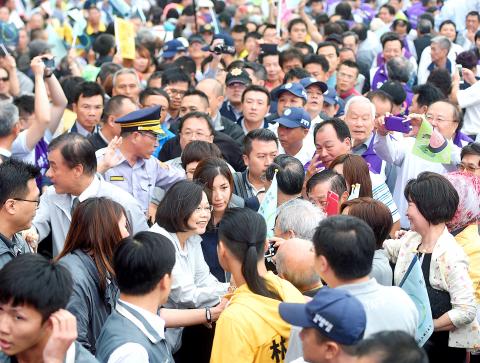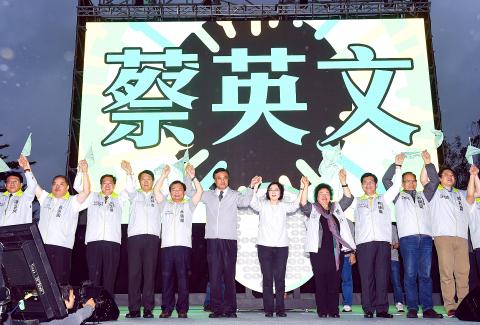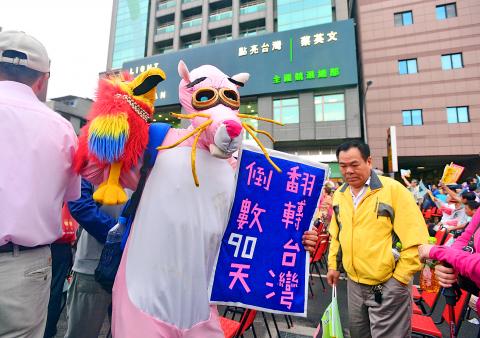Promising to lead Taiwan into a new age of tolerance, reconciliation, stability and peace, Democratic Progressive Party (DPP) presidential candidate Tsai Ing-wen (蔡英文) yesterday inaugurated her national campaign headquarters in front of a crowd of supporters in Taipei.
Tsai made her way slowly through the supporters — who greeted her with: “Hello, president,” and “victory for Tsai Ing-wen” — to reach the main stage outside of the building, where she announced its formal opening.
She asked DPP members holding public office, from borough wardens to local government heads and councilors, lawmakers, as well as support groups, to mobilize all the support they can to help the party win the January presidential and legislative elections.

Photo: Fang Pin-chao, Taipei Times
“The fight for political interests could never bring peace and prosperity for the people, and the struggle for power would not take the nation forward,” Tsai told the crowd. “Politics should be as simple as possible; it should respond directly to the needs of the people, it should help to solve the problems for the people and this is what I want to do for Taiwan.”
Tsai said that, if elected, she would form a government that makes stability and prosperity of the public a priority, adding that social progress should be the nation’s most pressing issue.
“My politics is the politics of solving problems for the people. My politics is the politics of fulfilling dreams for the people,” Tsai said, adding that she is confident she would be able to honor her words.

Photo: Fang Pin-chao, Taipei Times
Kaohsiung Mayor Chen Chu (陳菊), who is Tsai’s campaign manager, urged people to give the DPP another chance at running the nation, saying that Tsai is capable of leading the nation out of the difficulties it is facing, just as she led the DPP to stand up again following its defeat in the 2008 presidential election.
“At the DPP’s most difficult time, when it was on the verge of collapse, Tsai was brave enough to shoulder the responsibilities to lead the party,” Chen said. “Throughout the years, Tsai has led the party through storms, enabling us to see how strong, hard-working and professional she is as a leader.”
Chen said that instead of being tragic heroes who were jailed or had to constantly escape government repression — issues she said her generation of politicians faced — “Tsai represents a new generation of politicians who are calm and professional.”

Photo: Wang Yi-sung, Taipei Times
There were several booths set up to accept piggy banks filled with donations and there were long lines of supporters in front of the booths.
More than 2,000 piggy banks were submitted to the campaign headquarters during the event alone, according to DPP data.
Some waited in line to browse the “Ing Store” to purchase official campaign souvenirs, while others lined up before an automatic donation machine, which accepted notes and coins, as well as printed receipts.
The event featured musical performances, as well as a market selling locally grown agricultural products and handmade items.

SECURITY: As China is ‘reshaping’ Hong Kong’s population, Taiwan must raise the eligibility threshold for applications from Hong Kongers, Chiu Chui-cheng said When Hong Kong and Macau citizens apply for residency in Taiwan, it would be under a new category that includes a “national security observation period,” Mainland Affairs Council (MAC) Minister Chiu Chui-cheng (邱垂正) said yesterday. President William Lai (賴清德) on March 13 announced 17 strategies to counter China’s aggression toward Taiwan, including incorporating national security considerations into the review process for residency applications from Hong Kong and Macau citizens. The situation in Hong Kong is constantly changing, Chiu said to media yesterday on the sidelines of the Taipei Technology Run hosted by the Taipei Neihu Technology Park Development Association. With

CARROT AND STICK: While unrelenting in its military threats, China attracted nearly 40,000 Taiwanese to over 400 business events last year Nearly 40,000 Taiwanese last year joined industry events in China, such as conferences and trade fairs, supported by the Chinese government, a study showed yesterday, as Beijing ramps up a charm offensive toward Taipei alongside military pressure. China has long taken a carrot-and-stick approach to Taiwan, threatening it with the prospect of military action while reaching out to those it believes are amenable to Beijing’s point of view. Taiwanese security officials are wary of what they see as Beijing’s influence campaigns to sway public opinion after Taipei and Beijing gradually resumed travel links halted by the COVID-19 pandemic, but the scale of

A US Marine Corps regiment equipped with Naval Strike Missiles (NSM) is set to participate in the upcoming Balikatan 25 exercise in the Luzon Strait, marking the system’s first-ever deployment in the Philippines. US and Philippine officials have separately confirmed that the Navy Marine Expeditionary Ship Interdiction System (NMESIS) — the mobile launch platform for the Naval Strike Missile — would take part in the joint exercise. The missiles are being deployed to “a strategic first island chain chokepoint” in the waters between Taiwan proper and the Philippines, US-based Naval News reported. “The Luzon Strait and Bashi Channel represent a critical access

Pope Francis is be laid to rest on Saturday after lying in state for three days in St Peter’s Basilica, where the faithful are expected to flock to pay their respects to history’s first Latin American pontiff. The cardinals met yesterday in the Vatican’s synod hall to chart the next steps before a conclave begins to choose Francis’ successor, as condolences poured in from around the world. According to current norms, the conclave must begin between May 5 and 10. The cardinals set the funeral for Saturday at 10am in St Peter’s Square, to be celebrated by the dean of the College